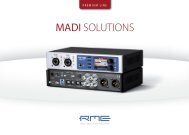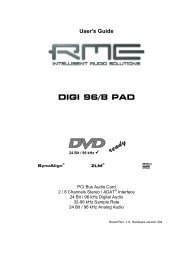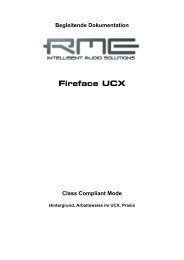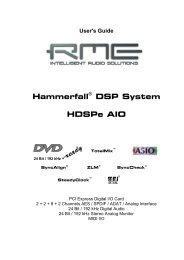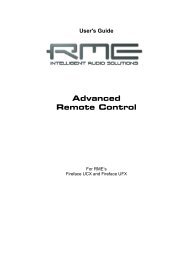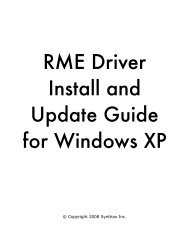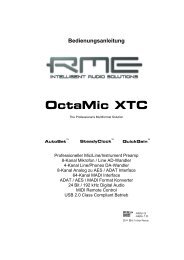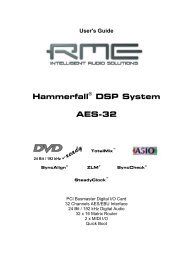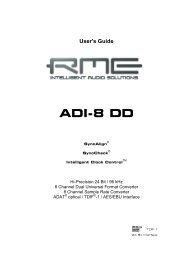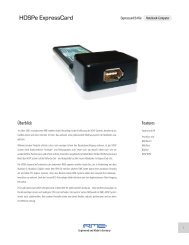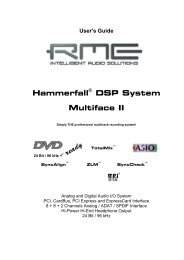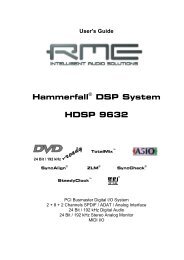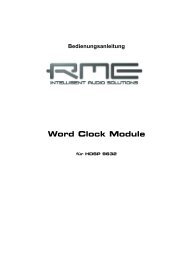Project Hammerfall® DIGI 9652 - RME
Project Hammerfall® DIGI 9652 - RME
Project Hammerfall® DIGI 9652 - RME
Create successful ePaper yourself
Turn your PDF publications into a flip-book with our unique Google optimized e-Paper software.
9.2 Clock Modes - Synchronization<br />
In the digital world, all devices are either the ‘Master’ (clock source) or a ‘Slave’ synchronized<br />
to the master. Whenever several devices are linked within a system, there must always be a<br />
single master clock. The Hammerfall's intelligent clock control is very user-friendly. Selecting<br />
'AutoSync' will activate this mode.<br />
In AutoSync mode, the Hammerfall constantly scans all digital inputs for a valid signal. If this<br />
signal corresponds with the current playback sample rate, the card switches from the internal<br />
quartz (Sync Ref displays 'Internal') to a clock generated from the input signal (Sync Ref<br />
displays 'SPDIF' or 'ADATx'). This allows on-the-fly recording, even during playback, without<br />
having to synchronize the card to the input signal first. It also allows immediate playback at any<br />
sample rate without having to reconfigure the card.<br />
AutoSync guarantees that normal record and record-while-play will always work correctly. In<br />
certain cases however, e.g. when the inputs and outputs of a DAT machine are connected<br />
directly to the Hammerfall, AutoSync causes feedback in the digital carrier, so synchronization<br />
breaks down. To remedy this, switch the card's clock mode over to 'Master'.<br />
Remember that a digital system can only have one master! If the Hammerfall’s clock mode<br />
is set to 'Master', all other devices must be set to ‘Slave’.<br />
All the ADAT optical inputs in the<br />
<strong>DIGI</strong><strong>9652</strong> as well as the SPDIF<br />
input will work simultaneously.<br />
Because there is no input selector<br />
however, the <strong>DIGI</strong><strong>9652</strong> has to<br />
be told which of the signals is the<br />
sync reference (a digital device can<br />
only be clocked from a single<br />
source). This is why the card has<br />
been equipped with automatic clock<br />
source selection, which adopts the<br />
first available input with a valid digital<br />
signal as the clock reference input.<br />
The input currently used as sync<br />
reference is shown in the 'Sync Ref'<br />
status field, together with the current<br />
sample frequency.<br />
Via 'Pref Sync Ref' (preferred<br />
synchronization reference) a<br />
preferred input can be defined. As<br />
long as the card sees a valid signal<br />
there, this input will be designated as<br />
the sync source, otherwise the other<br />
inputs will be scanned in turn. If none of the inputs are receiving a valid signal, the card<br />
automatically switches clock mode to ‘Master’.<br />
To cope with some situations which may arise in studio practice, setting ‘Pref Sync Ref’ is<br />
essential. One example: An ADAT recorder is connected to the ADAT1 input (ADAT1<br />
immediately becomes the sync source) and a CD player is connected to the S/PDIF input. Try<br />
recording a few samples from the CD and you will be disappointed. Few CD players can be<br />
synchronized. The samples will inevitably be corrupted, because the signal from the CD player<br />
is read with the (wrong) clock from the ADAT i.e. out of sync. In this case, 'Pref Sync Ref'<br />
should be temporarily set to SPDIF.<br />
User’s Guide <strong>DIGI</strong><strong>9652</strong> © <strong>RME</strong> 14



